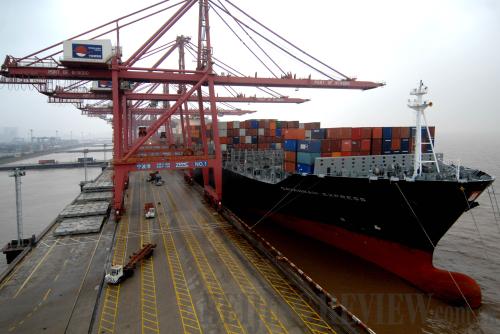|
 |
|
A container ship is loaded at the Ningbo Port on December 28, 2007 |
Numbers of the Week
570 million tons
The cargo traffic in Ningbo-Zhoushan Port, Zhejiang Province, totalled 570 million tons in 2009, overtaking Shanghai as the busiest port in the world, according to figures from Ministry of Transport of China.
128
The number of state-owned enterprises under Central Government administration had been reduced to 128 by February 2 after China National Packaging Corp. merged with China Chengtong Group, according to the State-owned Assets Supervision and Administration Commission of the State Council.
TO THE POINT: The United States' blatant arms sales to Taiwan will lead to a substantial loss for American companies that have huge economic interests in the Chinese mainland due to sanctions imposed by the Chinese Government. Newly listed companies have experienced declines in their share prices from IPO prices since the middle of January, raising concerns for the healthy development of China's stock markets. Railway construction in China topped the world in 2009. Computer giant Lenovo Group begins to see substantial profits after a sales decline last year. Hainan Island is undergoing a dramatic housing price surge on the news of the Central Government's decision to build the island into an international tourist destination.
By LIU YUNYUN
U.S. Paying the Price
All U.S. companies related to the $6.4-billion arms sales to Taiwan will lose large orders from the Chinese mainland.
At a press conference on February 2, Ma Zhaoxu, spokesman of the Ministry of Foreign Affairs, said China would place sanctions on U.S. companies that insisted on selling arms to Taiwan. Their market share in China could be crippled by their presumptuous actions.
U.S. companies involved in the arms sales to Taiwan include the Boeing Co., United Technologies, Lockheed Martin Corp. and Raytheon Co., among others. Raytheon has failed to secure business with the Chinese mainland since 2004 as a result of its repeated arms sales to Taiwan.
Rockwell Collins Inc. was reported to have sold Link-16 terminals for fighters, surveillance aircraft, and bombers worth $340 million to Taiwan. However, compared to possible orders from the Chinese Aviation Industry Corp. to build aircraft with Rockwell's independent intellectual property rights, the American company's arms sales to Taiwan was not a smart business decision.
Boeing's fate in China has aroused the biggest concerns. Boeing is expected to sell $37 million worth of Harpoon missiles to Taiwan, but will probably lose billions of dollars in orders from the Chinese mainland, as the price of the missiles is even less than the cheapest Boeing 737 civil aircraft. At present, more than half of the civil airplanes in the mainland are produced by Boeing. The U.S. aircraft maker also predicted China will need 3,700 more airplanes worth $400 billion in the coming two decades.
Stock Conundrum
At the beginning of the year, the threat of a depression loomed large over the Chinese stock markets. From January 4 to February 5, the benchmark Shanghai Composite Index dropped nearly 10 percent on rumors of tightening monetary measures and interest rate hikes.
February 3 marked Goldlok Toys Holdings (Guangdong) Co. Ltd.'s first day of trade on the Shenzhen stock market for small and medium-sized enterprises. But the company saw its share price fall 1.87 percent from its initial public offering (IPO) price of 21.98 yuan ($3.22), making it the first company whose stock prices fell behind the IPO price in five years on the Shenzhen market.
IPO companies on the main board—the Shanghai stock exchange—also suffered. China XD Electric Co. Ltd.'s share price lingered under its IPO price since its debut on January 28.
From mid-January to February 5, about 20 newly listed companies saw share prices drop below their IPO prices in succession.
A large-scale price decrease of this nature has yet to occur on mainland stock markets. The root cause of the decline is companies' and their sponsors' greediness, said analysts.
Issuers ignored the necessity of reasonable pricing to reap as much money as possible from the market. Goldlok Toys' price/earning ratio (P/E ratio) rose as high as 70.90, whereas a normal P/E ratio should be under 30.
Railway Rush
China experienced a railway construction frenzy in 2009 with investment totaling 700 billion yuan ($102 billion), the biggest single-year investment in history.
The mileage of Chinese railway in operation reached 86,000 km, ranking second in the world. The mileage of high-speed railway was 2,319 km—the longest in the world.
| 